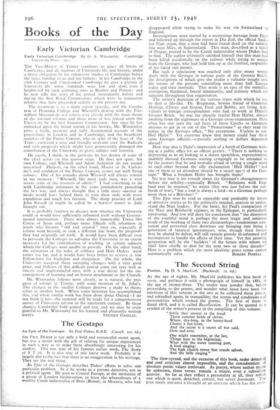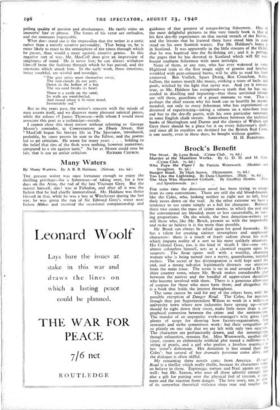The Second String
Poems. By D. S. MacColl. (Blackwell. 7s. 6d.)
AT the age of eighty, Mr. MacColl publishes his first book of verse, and prefaces it with a photograph of himself in 1882, at the age of twenty-three. The reader may ponder that, before proceeding to the poems, and wonder what must have been the emotions of this veteran in the arts as he collected these pieces, and rekindled again, in tranquillity, the scenes and conditions and personalities which evoked the poems. The first of them is dated 1878, and it is called Recollection. It can be quoted as a symbol of the writer's process in the compiling of this volume.
"Softly they answer to the tread Those summer fields of clover, Where, day-long, to the honey-head Chants a bee-lover, And the secret is a secret all but said, Over and over.
One might remember, at the last, Things near to the beginning; What with the water running past, A bird singing;
The high church tower that stands aghast,
And the bells ringing."
The time-spread, and the occasion of this book., make detached and cool criticism almost impossible, and the consideration of absolute poetic values irrelevant. As poetry, whose author might be unknown, these verses remain a minor, even a subsidiary activity. So far as they reflect a personality at all, they reed one which is quiet, detached, critical, but never dominant. Trio poet rarely presents a thought or an emotion which has the colt-
pelting quality of passion and absoluteness. He rarely coins an immortal line or phrase. The forms of his verse are orthodox, and the measures impeccable.
What does stand out is the impression that the writer is a critic rather than a naively creative personality. That being so, he is more likely to react to the atmosphere of the times through which he passes, than would a more egoistic creative genius. In this negative sort of way, Mr. MacColl does give an impression of singleness of mind. He is never lost; he can always withdraw himself from the fashions through which he has passed, and the emotions which attack him. In the early work, those emotions, being youthful, are wistful and nostalgic.
" The grey mists weep themselves away; The rain-clouds do not part; Down in the hollow of a bay The sea-sand breaks its heart. There is a castle on the sand; Its walls are weed-beclad, And round about it fir-trees stand, Inveterately sad."
But as the years pass, the writer's concern with the minds of men asserts itself, and we discover many pleasant satirical pieces, while the echoes of James Thomson—with whom I would most associate this poet as a technician—recede.
I cannot close this short review without referring to George Moore's reminder, in Conversations in Ebury Street, that " MacColl began his literary life in The Spectator, introduced, probably, by some poems he sent to the Editor, and the poems led to art criticism. He wrote for many years . . . holding to the belief that sins of the flesh were nothing, however numerous, compared to a sin against taste." So far as Moore could ever be fair, that is not an unfair criticism. RICHARD CHURCH.































 Previous page
Previous page